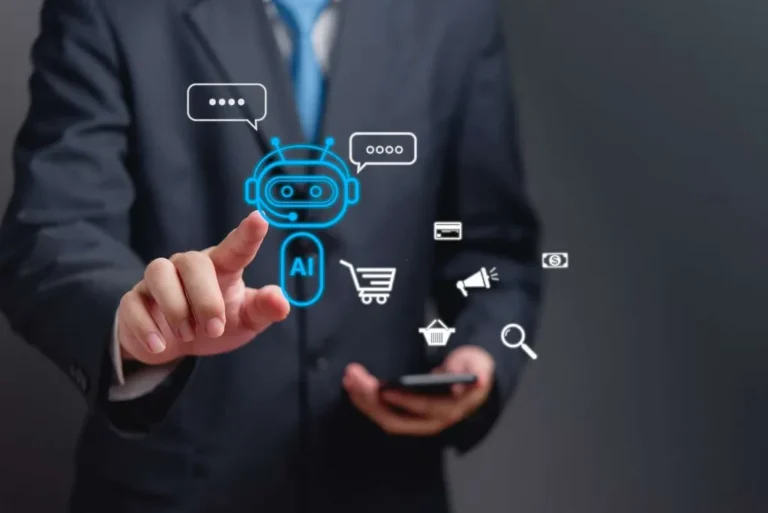How to Use Enterprise Chatbots to Achieve Business Goals

Providing personalized support requires using automated solutions that can answer client queries 24/7. The development of Artificial Intelligence (AI) technology led to the adoption of algorithm-based bots capable of providing context-relevant replies. Companies deploy Large Language Models (LLMs) to scale up operations, process huge volumes of data, and increase the satisfaction rate. The features of AI-powered systems enable firms to reach their strategic objectives. In this guide, we will explore how companies harness the power of enterprise chatbots to enhance customer experience (CX), expedite processes, and strengthen relationships with clients.
What are Enterprise Chatbots?
The term refers to advanced AI-driven solutions built to optimize client interactions and streamline other tasks. An LLM-based chatbot for business has many use cases ranging from boosting engagement to expediting onboarding. Such tools are designed to learn from experience and refine their performance to provide the information a user needs. They are deployed by companies of all sizes to improve customer support (CS) services and extract insights from datasets.
There are different types of enterprise chatbot solutions:
- Rule-based: These traditional solutions are pre-programmed to provide replies to simple questions. They are often used in FAQ sections to make it easier to find information.
- AI-powered: These innovative tools utilize natural language processing (NLP) technology to grasp subtle differences in meaning and interpret queries correctly. They put every question in context and adjust their communication strategies to provide replies tailored to users’ needs.
- Hybrid: Such solutions combine the features of the two other models. They act as rule-based tools and do not consume a lot of computing resources when answering basic questions. However, when they need to solve complex issues, they leverage AI.
Regardless of the type of automated tool, it’s essential to learn how to deploy it for maximum efficiency.

We are confident that we have what it takes to help you get your platform from the idea throughout design and development phases, all the way to successful deployment in a production environment!
Why Use Enterprise Chatbots
The recognition of the result-yielding potential of AI motivated many ventures to consider arguments in favor of automated tools. The usage of AI bots enables companies to achieve the following goals:
- Provide lightning-fast responses: Known for their capacity to analyze large volumes of information, they handle requests efficiently even during peak times. As 60% of clients believe that short response time is the most important part of professional customer service, the usage of bots facilitates building lasting relationships with buyers. Virtual assistants answer basic questions and escalate complex tasks to human employees. It allows CS teams to focus on providing personalized services.
- Expand outreach: The ability of chatbots to generate replies 24/7 allows ventures to serve clients from different time zones. It facilitates expanding operations and establishing a foothold in foreign markets. LLM-based bots analyze the history of interactions and formulate comprehensive replies written in a buyer’s native language. They have also demonstrated their effectiveness in email marketing.
- Build self-service platforms: 63% of consumers look for web-based resources when facing an issue, while 69% prefer to solve their problems on their own. Bots make it easier to find information as they recommend specific pages with detailed guidelines on how to act when facing various issues. It reduces the resolution time.
- Establish a strong connection with clients: By introducing clear escalation rules, companies ensure that a consumer will be able to communicate with human agents when facing serious issues. A virtual assistant can route a question to a specialist to ensure a buyer will get the most detailed reply.
Advanced bots seamlessly respond to questions and analyze the history of a client’s requests across multiple channels. They allow buyers to get the answer they need regardless of the device they prefer.

Main Use Cases of Enterprise Chatbots
Ventures continue to discover new ways automated systems can be used. LLMs make processes secure and enhance CX. Below, we have described the main applications popular today:
- Customer support: Digital assistants process incoming messages and offer solutions while communicating with clients in multiple languages. They maintain conversations in a human-sounding tone of voice and search across knowledge bases to discover information that may be of interest to customers. It allows them to resolve a higher number of complaints. Businesses implement such tools to process and organize massive amounts of client data. Automated data management tools retrieve insights without delays and answer questions across multiple threads simultaneously. The importance of a chatbot for enterprises lies in the fact that they recognize intent accurately and continue conversations from the moment they are stopped.
- Lead generation: Companies no longer need to spend a lot of resources to invest in finding high-quality leads. Using dedicated AI tools, they can engage visitors across multiple touchpoints, including eCommerce platforms, websites, social media, and popular messengers. Using natural language understanding (NLU) technology, they detect a buying intent and range leads depending on their quality. It enables businesses to expedite sales funnels. Bots also collect contact information about leads, which allows firms to make their marketing efforts targeted. Such capacities open a wealth of upselling opportunities. AI bots provide recommendations tailored to users’ needs. Besides, they send newsletters about the best bargains and loyalty programs.
- Helpdesk services: The usage of AI allows teams to perform routine tasks with ease. Employees use virtual assistants to quickly access data they need without searching through FAQ for hours. Such tools allow newly hired individuals to learn more about internal policies, products, and schedules. Human Resources teams utilize them to approve leaves, speed up onboarding, and offer benefits.
- Detailed guidelines for users: First-time buyers may need assistance to discover how to use a specific product. Digital customer service solutions let consumers report issues and discover product manuals. It allows ventures to improve client loyalty and reduce the cases that require human intervention. Chatbots are programmed to maintain high engagement.
- Data collection and retrieval: Large businesses create massive datasets. Structuring the information and accessing insights to measure the performance allows companies to achieve progress.
ChatOps practices involve the usage of communication tools to expedite software development and other related tasks. Chatbots are also increasingly often used in IT support. Firms create and implement AI solutions to reach strategic objectives. They facilitate inventory management, allow ventures to maintain an omnichannel presence, and help businesses establish lasting client relationships.
How to Build Enterprise Chatbots
Developing a custom LLM requires significant investments. Besides, a company should have a team of experts with strong technical backgrounds. However, hiring specialists knowledgeable about conversational AI technology is expensive. Many firms outsource the task of creating AI products to trusted providers. They typically follow such steps when developing bots for enterprise use:
- Create a database base: It should include information on the tickets solved by employees. After sorting them, it is possible to identify the most common questions that require simple answers. Chatbots provide replies in real time reducing the amount of workload.
- Consider the available support channels: AI bots solve clients’ issues via their favorite messengers and platforms. Some people prefer to communicate with brands via live chats, while others send DMs on social media. Chatbots remember information about the user’s favorite communication channels. Integrating them with customer relationship management (CRM) tools makes them even more useful. Before building an LLM, a firm should assess the available support systems to ensure seamless information exchange.
- Analyze the customer journey: A firm should examine what steps a client takes when facing an issue. They might experience problems at the checkout page or fail to find detailed information about a product. Detecting the barriers preventing people from placing an order is crucial to offer top-quality support.
- Customize LLMs: The process of creating personalized enterprise chatbots starts with detecting the main conversation points, setting escalation rules, and developing a brand’s voice. By tracking metrics, ventures identify the areas of improvement.
Collecting user feedback allows firms to assess satisfaction, understand how many tickets were solved by bots, analyze the failure rate, and improve the seamless functioning of an AI system.
How to Integrate Enterprise Chatbots
While small and mid-sized businesses use pre-built LLMs to avoid integration issues, large entities develop custom solutions to safeguard user data. After hiring specialists or establishing a partnership with an authoritative provider, firms focus on the implementation process. It involves multiple stages:
- Identifying workflows that can be optimized with the help of chatbots: Whether a venture needs to boost engagement or expand social media outreach, it’s crucial to decide on the processes that could benefit from the algorithm-powered solutions.
- Creating a list of features: Knowing what tools a company needs is crucial to make the process streamlined.
- Considering other apps used by a business: If a venture needs to integrate a chatbot with enterprise resource planning (ERP) software, it should prioritize LLMs with specific tools and functionality. Ensuring the seamless co-functioning of a chatbot and CRM facilitates data sharing and enables employees to discover valuable insights.
- Testing a chatbot and running it: After conducting multiple tests and refining LLM’s performance, ventures remove bugs. If no security issues are detected, they launch the algorithm-based assistants.
The Global Cloud Team specializes in building custom enterprise chatbots designed to optimize internal processes. By deploying them, companies enhance CX, streamline operations, achieve seamless integration of ERP and CRM systems, and ensure sustainable growth. Contact our experts now to discover how to harness AI tools to get a cutting edge.
Top Articles
Container vs VM (Virtual Machines): How Do They Differ?
I am here to help you!
Explore the possibility to hire a dedicated R&D team that helps your company to scale product development.






